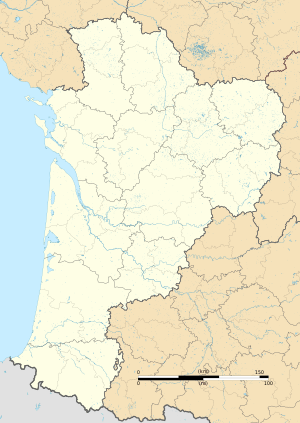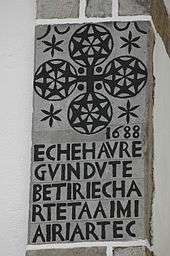Armendarits
| Armendarits | ||
|---|---|---|
| Commune | ||
|
Armendarits Town Hall | ||
| ||
 Armendarits Location within Nouvelle-Aquitaine region  Armendarits | ||
| Coordinates: 43°18′09″N 1°10′20″W / 43.3025°N 1.1722°WCoordinates: 43°18′09″N 1°10′20″W / 43.3025°N 1.1722°W | ||
| Country | France | |
| Region | Nouvelle-Aquitaine | |
| Department | Pyrénées-Atlantiques | |
| Arrondissement | Bayonne | |
| Canton | Pays de Bidache, Amikuze et Ostibarre | |
| Intercommunality | CA Pays Basque | |
| Government | ||
| • Mayor (2014-2020) | Lucien Delgue | |
| Area1 | 17.27 km2 (6.67 sq mi) | |
| Population (2015)2 | 411 | |
| • Density | 24/km2 (62/sq mi) | |
| Time zone | UTC+1 (CET) | |
| • Summer (DST) | UTC+2 (CEST) | |
| INSEE/Postal code | 64046 /64640 | |
| Elevation |
99–403 m (325–1,322 ft) (avg. 182 m or 597 ft) | |
|
1 French Land Register data, which excludes lakes, ponds, glaciers > 1 km2 (0.386 sq mi or 247 acres) and river estuaries. 2 Population without double counting: residents of multiple communes (e.g., students and military personnel) only counted once. | ||
Armendarits (Basque: Armendaritze) is a commune in the Pyrénées-Atlantiques department in the Nouvelle-Aquitaine region of south-western France.
The inhabitants of the commune are known as Armendariztar.[1][2]



Geography
Amendarits is located some 12 km south-west of Saint-Palais and some 8 km north-east of Irissarry and is in the former province of Lower Navarre. Access to the commune is by road D300 from Iholdy in the south to the village. The D8 going east from Iholdy also passes through the southern part of the commune. The D245 from Hélette in the west passes through the commune and the village and continues north to join the D14 just south-east of Méharin. There is also the D408 which links the village to the D8 road inside the commune. Apart from a few patches of forest the commune is entirely farmland.[3]
Numerous streams rise in the commune: the Erreka Handia and its tributaries flows north past the village, the Iharte also flows north to the east of the village, and the Ossinako Erreka forms part of the south-western border as it flows south.[3]
Places and Hamlets[4]
- Aguerréa[5]
- Aïntziondoa
- Albinoritzéko Borda (2 toponyms)
- Albinoritzia
- Altchia
- Alziéta
- Ameztoya
- Arbéletchia
- Armandegia
- Baratchartéa
- Barnetchia
- Bazterrechia
- Behamendy
- Béhitia
- Bidondoa
- Bigégaïnéa
- Bistaberry
- Bordaberria
- Bordaberriko Borda
- Bordamaria
- Bordécharria
- Bourdinateguia
- Carrica
- Céhabia
- Chichabalé
- Chimounénéa
- Chingolaénéa
- Chocohonia
- Curutzétako Borda[5]
- Donamaria
- Donapétria
- Donapétriko Borda
- Donamaria
- Donastéya
- Elhina
- Elinume
- Elizabéhéréko Borda
- Elizatchéko Borda
- Errékartéa
- Etchartéa
- Etchebarne[5]
- Etchébazterréa
- Etchégoïnberria
- Etchégoïnberriko Borda
- Etchégorria
- Etchénika
- Etchéparéa
- Eyhérabidé
- Eyhéraldéa
- Eyhéramounoa
- Fermindéguia
- Ferminéko Borda
- Gaïneko-Etchebarnéa
- Gaïneko-Meharu
- Garatéa
- Garatéko Borda
- Haramburua
- Harizhanditéguia
- Hatsandigaraia
- Iparréa
- Iribarnéa
- Irigaraya
- Ithurburua
- Ithurburuko Borda
- Jauregia[6]
- Jauréguicharria
- Landetxeberri
- Larraldéa
- Larramendia
- Lazalen Borda
- Legartoa
- Lekunberria
- Marihanditéguia
- Mehatzia
- Mendihilia
- Mendiondo
- Mendirigaraya
- Olhanéko Borda
- Olharanéa
- Orgalitegia
- Ossina
- Oyhanburua
- Oyhénartéa
- Pékoborda
- Pochulua
- Salla
- Sallaberria
- Sallaberriko Borda
- Sallagoitinéa
- Sorhoéta
- Sorogaraia[7] or Sorhogaraya
- Suhartéko Borda
- Teïleria
- Uhaldea[8]
- Uhartéa
- Urrutia[9]
- Urritiko Borda
- Zedarria
Toponymy
The commune name in Basque is Armendaritze.[2]
The following table details the origins of the commune name and other names in the commune.
| Name | Spelling | Date | Source | Page | Origin | Description |
|---|---|---|---|---|---|---|
| Armendarits | Armandarys | 1249 | Orpustan | Village | ||
| Armendariz | 1256 | Raymond | Bayonne | |||
| Sancta Maria de Armendaridz | 1256 | Raymond | Bayonne | |||
| Armendariz | 1264 | Orpustan | ||||
| Armendarriz | 1292 | Orpustan | ||||
| Armendaritz | 1366 | Orpustan | ||||
| Armendaritz | 1413 | Orpustan | ||||
| Armendaritz | 1428 | Raymond | Duchesne | |||
| Arbendaritz | 1529 | Raymond | Chapter | |||
| Aguerréa | Aguerre | 1863 | Raymond | Fief, vassal of the Kingdom of Navarre | ||
| Curutzétako Borda | La Croix Boria | 1863 | Raymond | Place of pilgrimage | ||
| Élissetche | Élissetche | 1863 | Raymond | Fief, vassal of the Kingdom of Navarre | ||
| Etchebarne | Etchebarne | 1863 | Raymond | Place of pilgrimage |
Sources:
- Orpustan: Jean-Baptiste Orpustan, New Basque Toponymy[10]
- Raymond: Topographic Dictionary of the Department of Basses-Pyrenees, 1863, on the page numbers indicated in the table. (in French)[5]
Origins:
History
Paul Raymond[5] noted on page 10 of his 1863 disctionary that Armendarits was a former Barony, vassal of the Kingdom of Navarre.
Heraldry
.svg.png) |
These arms were adopted by the town council in 2002 and are those of the Lords of Armendarits.[14] The blazon of quarters 2 and 3 are those of the village of Armendarits
Blazon: |
Administration
List of Successive Mayors[15]
| From | To | Name | Party | Position |
|---|---|---|---|---|
| 1939 | 1964 | Bertrand Ilharreborde | ||
| 1964 | 1986 | Juliette Richard | ||
| 1986 | 1989 | Laurent Garat | ||
| 1989 | 2020 | Lucien Delgue | UMP | President of the Community of Communes |
(Not all data is known)
Inter-communality
Armendarits is part of seven inter-communal structures:
- the Community of communes of Iholdi-Ostibarre;
- the AEP association of Arberoue;
- the Energy association of Pyrénées-Atlantiques;
- the inter-communal association for school transport and educational grouping of Méharin and Armendarits;
- the inter-communal association for development and management of the slaughterhouse at Saint-Jean-Pied-de-Port;
- the joint association Garbiki;
- the association to support Basque culture.
Demography
In 2009 the commune had 381 inhabitants. The evolution of the number of inhabitants is known from the population censuses conducted in the commune since 1793. From the 21st century, a census of communes with fewer than 10,000 inhabitants is held every five years, unlike larger towns that have a sample survey every year.[Note 1]
| 1793 | 1800 | 1806 | 1821 | 1831 | 1836 | 1841 | 1846 | 1851 |
|---|---|---|---|---|---|---|---|---|
| 706 | 764 | 799 | 805 | 840 | 792 | 809 | 840 | 818 |
| 1856 | 1861 | 1866 | 1872 | 1876 | 1881 | 1886 | 1891 | 1896 |
|---|---|---|---|---|---|---|---|---|
| 812 | 784 | 751 | 746 | 715 | 705 | 681 | 632 | 638 |
| 1901 | 1906 | 1911 | 1921 | 1926 | 1931 | 1936 | 1946 | 1954 |
|---|---|---|---|---|---|---|---|---|
| 631 | 623 | 600 | 562 | 510 | 506 | 559 | 512 | 420 |
| 1962 | 1968 | 1975 | 1982 | 1990 | 1999 | 2006 | 2009 | - |
|---|---|---|---|---|---|---|---|---|
| 446 | 420 | 396 | 386 | 372 | 357 | - | 381 | - |
Sources : Ldh/EHESS/Cassini until 1962, INSEE database from 1968 (population without double counting and municipal population from 2006)

Economy
Economic activity is mainly agricultural. The commune is part of the Appellation d'origine contrôlée (AOC) zone of Ossau-iraty.
Culture and Heritage
Civil Heritage
Several buildings and sites in the commune are registered as historical monuments:
- The Jauregia Manor (17th century)

- The Urrutia Farmhouse (1636)

- The Uhaldea Farmhouse (1780)

- The Sorogaraia Farmhouse (1602)

- Houses and Farms (17th-19th century)

- Other sites of interest
- A protohistoric fortified place (a gaztelu zahar) at Elhina.
Houses in Armendarits Picture Gallery
 Sculpted Lintel
Sculpted Lintel A sculpted breezeblock
A sculpted breezeblock A Lower Navarre House
A Lower Navarre House A Lower Navarre House
A Lower Navarre House A Lower Navarre House
A Lower Navarre House.jpg) A window on a Lower Navarre house
A window on a Lower Navarre house An Atalburu
An Atalburu
Religious Heritage

Hilarri Picture Gallery
Facilities
Education
The commune has a primary school.
Notable people linked to the commune
- Bernard Renau d'Eliçagaray (Eñaut d'Elizagarai), called little Renau, born in 1652 at Armendarits and died in 1719, was a mathematician, Inspector General of the Navy, in 1689 author of the Theory of Operation of Vessels.[18] He was especially famous for his Bomb vessels.[19] The pastoral of Soule in 2007 (at Camou-Cihigue) was dedicated to him.
See also
External links
- Armendaritze in the Bernardo Estornés Lasa - Auñamendi Encyclopedia (Euskomedia Fundazioa) (in Spanish)
- Armendarits on Lion1906
- Armendarits on Google Maps
- Armendarits on Géoportail, National Geographic Institute (IGN) website (in French)
- Armendaritz on the 1750 Cassini Map
- Armendarits on the INSEE website (in French)
- INSEE (in French)
Notes and references
Notes
- ↑ At the beginning of the 21st century, the methods of identification have been modified by Law No. 2002-276 of 27 February 2002 Archived 6 March 2016 at the Wayback Machine., the so-called "law of local democracy" and in particular Title V "census operations" allows, after a transitional period running from 2004 to 2008, the annual publication of the legal population of the different French administrative districts. For communes with a population greater than 10,000 inhabitants, a sample survey is conducted annually, the entire territory of these communes is taken into account at the end of the period of five years. The first "legal population" after 1999 under this new law came into force on 1 January 2009 and was based on the census of 2006.
References
- ↑ Brigitte Jobbé-Duval, Dictionary of place names - Pyrénées-Atlantiques, 2009, Archives and Culture, ISBN 978-2-35077-151-9 (in French)
- 1 2 Euskaltzaindia - Academy of the Basque Language (Basque)
- 1 2 3 Google Maps
- ↑ Géoportail, IGN (in French)
- 1 2 3 4 5 Topographic Dictionary of the Department of Basses-Pyrenees, Paul Raymond, Imprimerie nationale, 1863, Digitised from Lyon Public Library 15 June 2011 (in French)
- 1 2 Ministry of Culture, Mérimée IA64000771 Jauregia Manor (in French)

- 1 2 Ministry of Culture, Mérimée IA64000768 Sorogaraia Farmhouse (in French)

- 1 2 Ministry of Culture, Mérimée IA64000769 Uhaldea Farmhouse (in French)

- 1 2 Ministry of Culture, Mérimée IA64000770 Urrutia Farmhouse (in French)

- ↑ Jean-Baptiste Orpustan, New Basque Toponymy, Presses universitaires de Bordeaux, 2006, ISBN 2 86781 396 4 (in French)
- ↑ Manuscript from the 14th century in the Departmental Archives of Pyrénées-Atlantiques (in French)
- ↑ Duchesne Collection, volumes 99 to 114, containing the papers of Oihenart, former Imperial Librarian - Bibliothèque nationale de France
- ↑ Chapter of Bayonne in the Departmental Archives of Pyrénées-Atlantiques (in French)
- ↑ Arms of France (in French)
- ↑ List of Mayors of France (in French)
- ↑ Ministry of Culture, Mérimée IA64000819 Houses and Farms (in French)
- ↑ Ministry of Culture, Mérimée IA64000818 Parish Church of Saint Peter (in French)
- ↑ Manex Goyhenetche, General History of Basque Country - Vol. 3, Elkarlanean, 2001, ISBN 2 9131 5634 7, page 225. (in French)
- ↑ Stephen Bull (2004). Encyclopedia of military technology and innovation. Greenwood Publishing Group. p. 44. ISBN 978-1-57356-557-8.
| Wikimedia Commons has media related to Armendarits. |


